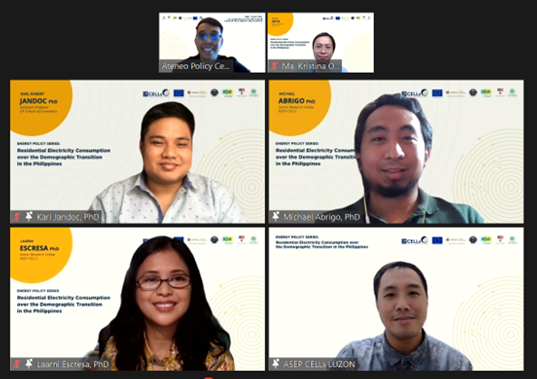Energy Policy Series examines the effects of population ageing on electricity demand
19 Jul 2021
Through the Access to Sustainable Energy Programme-Clean Energy Living Laboratories (ASEP-CELLs), the Ateneo School of Government, with the funding support from the European Union, held the fifth installment of the virtual Energy Policy Series (EPS) last July 9, 2021.
With 50 participants from various government agencies, academic institutions, private sector, and civil society, ASEP-CELLs’ senior research fellow Dr. Michael RM Abrigo, and research assistant Ms. Ma. Kristina Ortiz presented their working paper titled, “Residential Electricity Consumption Over the Demographic Transition in the Philippines.” Joining the panel were Assistant Professor Karl Robert L. Jandoc, Ph.D., and Associate Professor Laarni Escresa, Ph.D., of the University of the Philippines School of Economics, as reactor and moderator, respectively.
Dr. Abrigo and Ms. Ortiz’s working paper examined how population age structure could affect residential electricity demand in the Philippines. The working paper first described the residential electricity demand as a product of three factors, namely: (1) electrification rate, (2) size of a population by age, and (3) average usage by age.
The paper explains that the growth in residential electricity demand can be explained by access (increase in electrification rate), scale (increase in population), and intensity (increase in usage intensity by the population). The age of the population is classified under intensity. Dr. Abrigo and Ms. Ortiz’s paper expounded on how the demographic transition in the country can raise per capita income and, in turn, increase the consumption of residential electricity.
As a reactor, Dr. Jandoc emphasized the important contribution of the research grounded on the context of a developing country instead of previous research that focused on developed countries. For his technical comments, Dr. Jandoc said it would be helpful to discuss the effects of technological improvements in the efficiency of electrical appliances, which affect consumption. He also suggested having controls for this in the study’s models. Dr. Jandoc commented that a similar decomposition analysis might be done over expenditures and not on electricity consumption itself. His final suggestion was to consider the difference in electricity consumption for residents in rural and urban areas.
In response, Dr. Abrigo agreed that the controls suggested by Dr. Jandoc will be helpful to the analysis. He also concurred with Dr. Jandoc’s suggestion of separating the estimation by urbanity but argued that it is beyond the scope of the paper.
The open forum, moderated by Dr. Escresa touched on various factors that could affect electricity demand, such as technology innovation, climate change, and other uncertainties such as the pandemic. The open forum also raised the need for strategic planning to prioritize innovation, social welfare, and sustainability as the aging population will significantly affect electricity demand. Other discussion points highlighted the most probable scenarios in electricity demand in the years to come.
Access the working paper of Dr. Abrigo and Ms. Ortiz here. A recording of the webinar is also available through the ASOG Facebook page.
The Energy Policy Series or EPS is a virtual public forum that enjoins vital stakeholders from the domestic and international energy sector to dissect relevant critical issues that center on energy access, renewable energy, and energy efficiency. It features cutting-edge research from the ASEP-CELLs that contributes to pragmatic and impactful energy policymaking in the Philippines and beyond.
